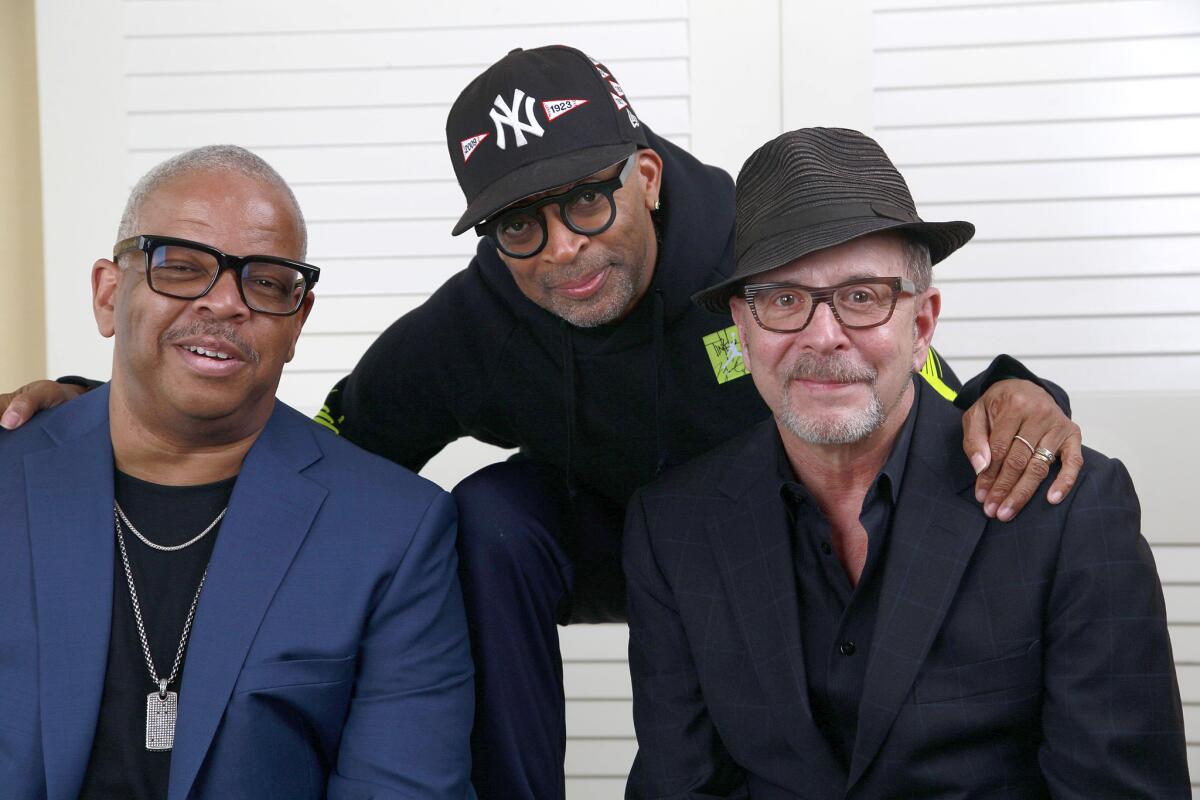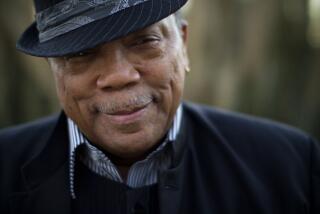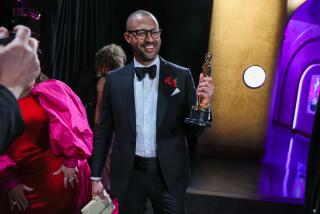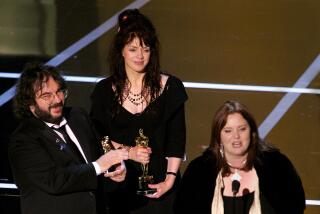For Spike Lee and his two longtime collaborators, ‘BlacKkKlansman’ Oscar nods hold extra meaning

Spike Lee has long been known as a presence courtside at professional basketball games. But not many people realize he has a team of his own in his longtime editor Barry Alexander Brown and composer Terence Blanchard.
The trio has been working together since some of Lee’s earliest films — Brown was the editor for 1989’s “Do the Right Thing” and 1988’s “School Daze,” Blanchard the composer on 1991’s “Jungle Fever,” and all three are credited on 1992’s “Malcolm X.” And this year, for the first time, all three are Oscar nominees for their work together.
Thanks to “BlacKkKlansman,” Lee earned his first nominations in the director and best picture categories, Brown landed his first editing nomination and Blanchard picked up his first nomination for original score. (Lee was also Oscar nominated along with Kevin Willmott, Charlie Wachtel and David Rabinowitz for adapted screenplay, and Adam Driver was nominated for supporting actor.)
“BlacKkKlansman” is based on the story of Ron Stallworth, the first African American officer on the Colorado Springs, Colo., police Force. In the film, Stallworth (John David Washington) begins to infiltrate a local chapter of the Ku Klux Klan by impersonating a white man over the phone, eventually sending his partner (Driver) for in-person meetings as their increasingly complicated and dangerous scheme draws in grand wizard David Duke (Topher Grace). The film ends with an emotional coda of actual footage from the violence in Charlottesville, Va., in August, 2017, bringing a story of the past into a startling present tense.
The film’s world premiere at the Cannes Film Festival in May drew a lengthy standing ovation, and Lee went on to win the festival’s Grand Prix award. In its late summer release from Focus Features, the film brought in close to $90 million worldwide and ranks as Lee’s second biggest global hit ever, behind “Inside Man.”
After the recent Oscar nominees luncheon in Beverly Hills, Lee, Blanchard and Brown sat down in a hotel suite for an interview together. Their long-running friendship, warmth and camaraderie are palpable as the conversation easily skips across decades and projects including “25th Hour,” “Bamboozled,” “Miracle at St. Anna” and the documentaries “Four Little Girls” and “When the Levees Broke.”
As for why “BlacKkKlansman” was the film to garner each of them this recognition at long last, Lee was circumspect.
“Well, there’s several ways you can answer that question,” Lee said, throwing one leg over the arm of a stuffed chair as he settled in. “One is timing. It’s just the time and this film, the stars were in alignment. Also, this film has connected the past with the crazy present day. Those are two things that I think are the big standouts of why everything has happened on this film.”
As they all would throughout their conversation, Brown easily picked up the thread of Lee’s idea, adding, “Look at how the film turned out: There’s no deleted scenes. Spike shot the script, I cut the script. Terence and Spike were in the room seeing this film for the first time on Jan. 8 [2018]. And Spike was just like, ‘That’s it, we’re going for Cannes. We’re going for Cannes.’ Because you thought it right then — there was some magic there.”
“I’ve been telling people it’s the culmination of us having been working together for 30 years,” said Blanchard. “People go into the movie thinking they are watching a period film, which they are, and then you go through that entire story, which is very compelling, and then you get to the end, and he puts that [Charlottesville] montage there. And [watching the movie] we all like to think that, ‘Oh, that was then.’ But that montage says we haven’t really moved too far away from that. That’s like a startling wake-up call for a lot of people.”
A video clip of Lee and his family reacting excitedly on Oscar nominations morning became a popular viral hit. But Lee brings it up to point out that he was specifically celebrating the nomination for best picture and how it recognized everyone involved in the movie.
“It’s a team,” Lee said. “It’s a squad. And that video of me and the announcement, that clip is for the final one.
“When his name come up, I called Barry. He’s in a dentist chair. Then I called Terence, then I called Adam,” Lee said. “I mean we go way back — I’ve never been nominated for director before, best picture. So there’s a lot of firsts. Some of you got it twisted like that — [the reaction] wasn’t the best director [nomination], that was for best picture, which is everybody. Everybody.”
Though Brown was first credited on “School Daze,” Lee’s second picture, he recalled helping with some scenes on Lee’s 1986 debut feature “She’s Gotta Have It,” working at an editing machine in a converted Brooklyn garage with no heat.
“You know, your buddy is making a feature,” Brown recalled. “It’s like, ‘What do you want me to do?’
“We all grow,” Brown continued. “And what’s great about working together is that you’re learning the language of it, because the first films are like, ‘Wow.’ Even the first time you get on a real set with a real crew, the first time I saw that on ‘School Daze,’ I was intimidated. So you grow together and you learn from each other.”
“And let me tell you, that carries over into the music,” added Blanchard, “because when he called me to do ‘Jungle Fever,’ I’m glad you said that because when I walked into the studio and saw 70 musicians sitting there and they’re waiting for me to come out there? It’s one of those moments. And you go out there and you start to do your job and the next thing you know, the craft takes over.”
Blanchard had played trumpet on the scores for “School Daze,” “Do the Right Thing” and “Mo’ Better Blues,” before being asked to take over writing the music himself on “Jungle Fever.”
“And prior to that, I never had aspirations to be a film composer. Ze-ro,” said Blanchard. “I was going to be the next Miles Davis, I was going to change the world playing my horn. But when I saw what was going on and I studied composition, I said, ‘Man, that will be a kind of a cool gig.’ And lo and behold, I got a chance to write something, and then everything turned. My life changed.”
!["This film ['BlacKkKlansman'] has connected the past with the crazy present day," says Spike Lee, center, with longtime collaborators Barry Alexander Brown, left, and Terence Blanchard.](https://ca-times.brightspotcdn.com/dims4/default/2bd19c4/2147483647/strip/true/crop/2048x1467+0+0/resize/1200x860!/quality/75/?url=https%3A%2F%2Fcalifornia-times-brightspot.s3.amazonaws.com%2F5f%2Fea%2F8e4d9e3fb482d7e9a345037e8f58%2Fla-1549482931-ggljg0cgy2-snap-image)
For the music of “BlacKkKlansman,” Lee wanted a rhythm section alongside Blanchard’s signature horns and strings to create a funkier, 1970s-influenced sound. Blanchard turned to the rhythm section of his own band, The E-Collective, but also added the group’s guitar player Charles Altura to play what has become the signature theme of the movie.
“When I saw the first cut and you see John David Washington walking with those bell-bottom jeans on, for some reason my mind went to Jimi Hendrix playing the national anthem at Woodstock,” Blanchard said. “So I wanted to have a sound from that period that would kind of reflect that. To me, that’s what the electric guitar was all about.”
“BlacKkKlansman” also captures Lee’s quicksilver abilities with tone, switching from humor to drama to playful satire to deep emotions with ease. If there is a signature to Lee’s work, it may be that unpredictability and the way his films percolate with an energy that refuses to be contained.
“I don’t think either one of us think in terms of genres,” Brown said. “We’re storytellers, and there’s so many times people think, it’s a genre, it’s a comedy, it’s a drama, it’s a thriller, this is a bank robbery — and neither one of us can really quite think this way … I think it just kind of comes natural to us in terms of what’s interesting at this moment.”
“What’s interesting about what you’re saying,” noted Blanchard, “is in this moment right now, I’ve been flustered by so many people asking me about the humor in the film, and I go, ‘But he always has humor in his films.’ ”
“ ‘Do the Right Thing’ is funny as a mother …,’” Lee said, adding, “People are very limited in their thinking.”
For Lee, enjoying this awards season moment is extra sweet because he can do so alongside Blanchard and Brown, his longtime friends and collaborators. Seeing recognition not just for the film but for the team has made it all the more meaningful. It also pushes them forward to continue that creative partnership.
“Everybody’s committed,” Lee continued, “And the more everybody controls that craft, the better the story can be told. Also, another thing I’d like to say is that we all love what we do ... I wouldn’t trade any of what I do.
“And when you love what you do and work with people who do the same, it’s a great feeling,” Lee said. “It’s like sports, when you got a great team and you are clicking on all cylinders. Everybody loves each other and gets along, everybody wants to win. That don’t happen all the time.”
Listen to more of Mark Olsen’s interview with Spike Lee, Terence Blanchard and Barry Alexander Brown on an upcoming episode of the L.A. Times’ entertainment podcast “The Reel.”
SIGN UP for the free Indie Focus movies newsletter »
Follow on Twitter: @IndieFocus
More to Read
Only good movies
Get the Indie Focus newsletter, Mark Olsen's weekly guide to the world of cinema.
You may occasionally receive promotional content from the Los Angeles Times.









